The information below is current as at 1/1/17.
Shapes Strategic Thinking and Change
Between 1991 and 1995 Colby was employed as Research Officer at Child and Adolescent Mental Health Services – Southern (Southern CAMHS). In this role Colby collaborated primarily with Emeritus Professor Graham Martin OAM (then Chief Psychiatrist and Director of Southern CAMHS). The first international publication[1] that arose from this collaboration highlighted the importance of connection in understanding suicidality in teens and is a forerunner for ideas that inform national suicide prevention initiatives such as the RUOK? campaign.
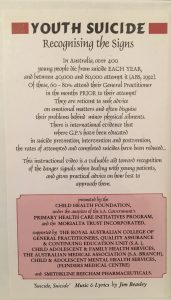 A
A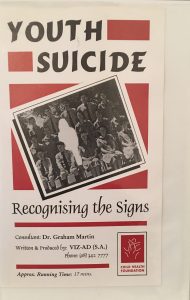 later publication[2], first authored by Colby, formed the basis for the assessment framework for the video Youth Suicide: Recognising the Signs, which was produced in 1995 by the Child Health Foundation as part of a nation-wide education program for General Medical Practitioners and was a forerunner for later national suicide prevention initiatives.
later publication[2], first authored by Colby, formed the basis for the assessment framework for the video Youth Suicide: Recognising the Signs, which was produced in 1995 by the Child Health Foundation as part of a nation-wide education program for General Medical Practitioners and was a forerunner for later national suicide prevention initiatives.
Reference to Google Scholar shows that both articles continue to be cited to the present year, with the first cited 165 times and the latter cited 70 times.
Between 1995 and 2002 Colby was employed by the then Department for Family and Community Services (FACS) – now the Department for Child Protection (DCP). Recognising the dearth of evidence-informed and theory-driven practice and extending from his earlier research that highlighted the importance of connection in the welfare and wellbeing of young people, Colby actively promoted reference to Attachment Theory in case management and decision-making in the professional work of psychologists and social workers in the organisation. Colby was the lead writer and trainer for an in-service training package concerning Attachment Theory and its practical application in child protection practice that was first rolled out in 2002 and was the forerunner for ongoing staff training initiatives spanning the last fifteen years.
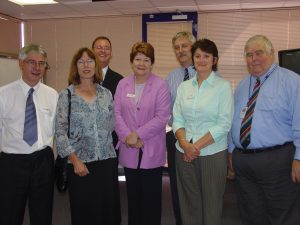 In 2005 Colby was independently approached by representatives of two local universities to establish training clinics in child clinical psychology practice. Following negotiation with management in the then Families SA, Colby established the first Child Wellbeing Clinic[3] in January 2006 with seed funding from the Northern Wellbeing Project. A second clinic followed in January 2007. The first clinic was formally opened by Sue Vardon (CE, Families SA) in February 2006, and the Child Wellbeing Clinic(s) continued in operation for two and a half years; initially as a partnership arrangement between the University of South Australia and Families SA (2006-2007), and subsequently as a partnership arrangement between between Families SA and Secure Start® (2008). Thereafter, the Child Wellbeing Clinic model was adopted by Flinders University of South Australia and the University of Adelaide in training clinics that continue to operate to this day in partnership with the Department for Child Protection.
In 2005 Colby was independently approached by representatives of two local universities to establish training clinics in child clinical psychology practice. Following negotiation with management in the then Families SA, Colby established the first Child Wellbeing Clinic[3] in January 2006 with seed funding from the Northern Wellbeing Project. A second clinic followed in January 2007. The first clinic was formally opened by Sue Vardon (CE, Families SA) in February 2006, and the Child Wellbeing Clinic(s) continued in operation for two and a half years; initially as a partnership arrangement between the University of South Australia and Families SA (2006-2007), and subsequently as a partnership arrangement between between Families SA and Secure Start® (2008). Thereafter, the Child Wellbeing Clinic model was adopted by Flinders University of South Australia and the University of Adelaide in training clinics that continue to operate to this day in partnership with the Department for Child Protection.
In recent years Colby has become increasingly active in promoting his longstanding belief about the importance of implementing therapeutic models of care in alternate care, with a view to achieving service improvement and accountability in the care of children recovering from abuse and neglect, and to attract and look after this vital resource in child protection endeavours. As part of Colby’s activity he has shared his views with agency management and with the former Minister and her staff. Colby has developed a therapeutic model of care – the Triple-A Model of Therapeutic Care[4] – which was formally implemented within Centacare in 2014/15 as part of their Intensive Family Preservation Foster Care Program. Following a successful pilot program implemented between January and March 2016[5], the Triple-A Model of Therapeutic Care will now be implemented as the preferred model of care among TUSLA (Child and Family Agency) foster carers in Donegal, Ireland, over three years.
 Much of how Colby’s ideas, particularly those expressed in his published works, have shaped strategic thinking and change is beyond his contemporary awareness. However, Colby is aware of two relevant examples. His book A Short Introduction to Attachment and Attachment Disorder has maintained its place on the recommended reading list for all psychology applicants for registration who must sit the National Psychology Examination in Australia since the content and curriculum for the examination was first developed in or around 2011. This list[6] is endorsed by the Psychology Board of Australia and represents key knowledge that all psychology applicants for registration who must sit the exam should be familiar with. Colby is also informed that Royal Commissioner Margaret Nyland and her staff read his book as part of their orientation to the work of the Royal Commission into Child Protection Systems and the book is referenced as a source in the Royal Commissioner’s report, The Life They Deserve.
Much of how Colby’s ideas, particularly those expressed in his published works, have shaped strategic thinking and change is beyond his contemporary awareness. However, Colby is aware of two relevant examples. His book A Short Introduction to Attachment and Attachment Disorder has maintained its place on the recommended reading list for all psychology applicants for registration who must sit the National Psychology Examination in Australia since the content and curriculum for the examination was first developed in or around 2011. This list[6] is endorsed by the Psychology Board of Australia and represents key knowledge that all psychology applicants for registration who must sit the exam should be familiar with. Colby is also informed that Royal Commissioner Margaret Nyland and her staff read his book as part of their orientation to the work of the Royal Commission into Child Protection Systems and the book is referenced as a source in the Royal Commissioner’s report, The Life They Deserve.
Finally, Colby’s qualification to shape strategic thinking and change has been acknowledged in his recruitment to the review of a national multidisciplinary clinical team that operates in Ireland.
Achieves Results
Colby’s entire career has been results driven.
In 1991 Colby was hired to get a research program up and running. Within two years he and his collaborators had the first international, peer-reviewed publication in what, at the time, was the Psychiatry periodical with the fourth-highest readership in the world – the Journal of the American Academy of Child and Adolescent Psychiatry. Colby was twenty-three years of age at the time and completing a full-time Masters Degree in Applied Psychology at the University of Adelaide.
In 1994 Colby’s first-authored publication Predicting Suicide Attempts Among Adolescents was published in Acta Psychiatrica Scandinavica, a Psychiatry periodical ranked in the top ten in the world for readership at that time. The assessment methodology reported on in this publication became an essential component in one of the first Australia-wide suicide prevention initiatives: Youth Suicide – Recognising the Signs.
In 1995 Colby was hired to renew a clinical psychology service to the Elizabeth District Centre of the Department for Family and Community Services after an 18-month absence of service provision. Within three years office management sacrificed a social work position in favour of an expanded clinical psychology service to the office – an outcome that was contrary to the trend in other government agencies at that time and reflected the esteem with which the service Colby offered in statutory child protection matters was held.
In 2001 Colby was given the responsibility for developing an in-service training program in practical applications of Attachment Theory in the child protection context, which became the forerunner of enduring training endeavours in what is now known as the Department for Child Protection over the past fifteen years.
In 2002 Colby was appointed to the assessment team that visited the Woomera Detention Centre to assess and advise on the welfare and wellbeing of children in the aftermath of the ‘Easter Riots’ and at the instigation of the then Premier of South Australia.
In January 2003 Colby commenced practising full-time in his own independent child and family psychology practice, Secure Start®. Colby was the sole-income earner in his household with three young dependent children. Colby’s practice continues to operate fourteen years later and, by virtue of his published and overseas work, is known and has standing internationally.
In 2005 Colby was independently approached by two South Australian Universities to establish a child clinical psychology training clinic. Within three months the first Child Wellbeing Clinic was established as a partnership arrangement between the University of South Australia and Families SA, with Colby being the inaugural Director. A year later a second clinic was established. This training clinic model was subsequently adopted by Flinders University of South Australia and Adelaide University in clinics that have continued to operate to the present day.
In 2008 Colby was approached by several parties, including the Adelaide Northern Division of General Practice (ANDGP), to establish a clinical psychology service to vulnerable children and families in outer northern metropolitan Adelaide. Within two months, the Northern Kids Wellbeing clinic was operating through the offices of ANDGP and the Playford Community Health Centre.
In 2008, 2010 and 2015 Colby was contracted by Jessica Kingsley Publishers (London and New York) to write each of his three books; all of which met agreed publication timetables and are available for purchase internationally.
In 2014 and 2016 Colby was contracted to provide therapeutic care programs in the Centacare Intensive Family Preservation Foster Care program (South Australia) and Donegal TUSLA (Republic of Ireland) respectively. A preliminary evaluation of the Donegal implementation of the Triple-A Model of Therapeutic Care was published in the Irish Foster Care Association’s periodical, Foster[7], mid-year (2016).
Finally, across the last twenty one years Colby has conducted many hundreds of assessments and prepared reports in highly scrutinised environments, including in South Australian Courts.
Drives Business Excellence
Between 1991 and 1995 Colby was responsible for facilitating the development of a productive and successful research programme that achieved an international publication record and independent government funding, and informed suicide prevention endeavours in the more than twenty years since. Colby was twenty-one years of age when he started this endeavour.
Between 1995 and 2002 Colby contributed directly to the expansion of clinical psychology services in child protection in South Australia and the promotion of evidence informed and theory-driven practice among psychology and social work staff in the Department that persists to this day. Since 1997 Colby has trained more than fifty practising Psychologists in child clinical psychology, with a particular focus on practise with the most vulnerable children in our society. A great many of Colby’s former trainees have or continue to work in the Department for Child Protection, with one currently holding an executive position in the Department. Between 2005 and 2008 Colby established and directed the Child Wellbeing Clinics, training clinics that became the template for future collaborations between the then Families SA and the university sector.
Since 2002 Colby has developed his own independent psychology practise offering clinical services, consultancy and programs in South Australia and the Republic of Ireland. Colby’s practice and work is known and respected internationally.
Forges Relationships and Engages Others
As both a Research Officer at Southern CAMHS and Clinical Psychologist at the Department for Family and Community Services (now DCP) Colby had a proven track record of forging effective working relationships with others that achieved desired outcomes; examples of which have been provided heretofore.
In private practice since 2002 Colby has a long and well-established history of forging professional relationships with referral sources; including professionals in the child protection, intercountry adoption, Family Court, primary health care and disability sectors.
Between 2005 and 2008 Colby facilitated the establishment of a formal business relationship between local university psychology training programs and Families SA; a mutually-beneficial relationship that persists to this day.
Colby established mutually-beneficial relationships with international experts in the care of children, resulting in such collaborations as the implementation of the Triple-A Model of Therapeutic Care among TUSLA (Child and Family Agency) foster carers (and the professionals who support them) in Donegal, Ireland, and his recent appointment to the review process of the Assessment Consultation Therapy Service (ACTS) that services Special [Secure] Care and Detention Schools in Ireland.
Colby has a demonstrated capacity to engage, communicate and develop productive relationships with others that achieve desired outcomes in various roles and contexts (including research, academic, government, non-government, statutory, community), through a variety of mediums (training, consultation, writing, assessment, psychotherapy) and with a variety of audiences (professional, lay, children and young people). Amongst Colby’s diverse professional activities, he recently conducted a lesson with a year 11 psychology class at his son’s school on the topic of childhood trauma. This was a lot of fun for the teacher, students, Colby and even his son, whose only instruction to Colby was to not tell any jokes!
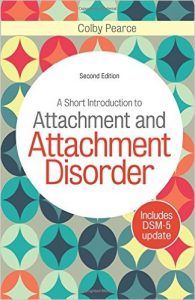 However, one of Colby’s dearest achievements is that he has developed a service and a way of working that is based on reflective practice with children and young people (what they want and need from adults in a supporting and supportive role) and had the opportunity to train other professionals and inform a diverse professional and lay audience through his books and other publications. This approach is most clearly articulated in the revised and updated Second Edition of A Short Introduction to Attachment and Attachment Disorder, which is available in Australia in January 2017.
However, one of Colby’s dearest achievements is that he has developed a service and a way of working that is based on reflective practice with children and young people (what they want and need from adults in a supporting and supportive role) and had the opportunity to train other professionals and inform a diverse professional and lay audience through his books and other publications. This approach is most clearly articulated in the revised and updated Second Edition of A Short Introduction to Attachment and Attachment Disorder, which is available in Australia in January 2017.
Exemplifies Personal Drive and Professionalism
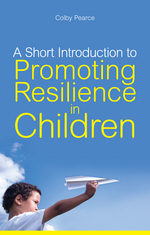 In his 2011 book A Short Introduction to Promoting Resilience in Children Colby tells part of his own story of recovery from adversity to success as a clinical researcher and clinical psychologist, a journey that has since progressed to international trainer and consultant in the therapeutic care of children and the provision of clinical services to vulnerable young people in statutory settings. The journey Colby has made to date and the position and standing he has achieved has been far from easy and regularly beset with new challenges and sources of adversity. However, in achieving the standing he currently have in the international child protection and child care community Colby has had to rely on an unwavering commitment to excellence in all that he does and a fair dose of personal grit and determination. In the wise words of Friedrich Nietzsche, that which does not kill me makes me stronger.
In his 2011 book A Short Introduction to Promoting Resilience in Children Colby tells part of his own story of recovery from adversity to success as a clinical researcher and clinical psychologist, a journey that has since progressed to international trainer and consultant in the therapeutic care of children and the provision of clinical services to vulnerable young people in statutory settings. The journey Colby has made to date and the position and standing he has achieved has been far from easy and regularly beset with new challenges and sources of adversity. However, in achieving the standing he currently have in the international child protection and child care community Colby has had to rely on an unwavering commitment to excellence in all that he does and a fair dose of personal grit and determination. In the wise words of Friedrich Nietzsche, that which does not kill me makes me stronger.
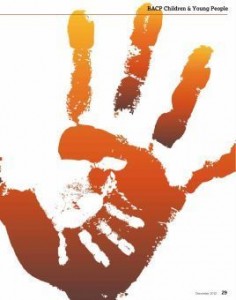 Colby is proud of his career achievements to date, which have been forged through integrity, professionalism and adherence to strong personal and professional ethical codes. Colby has not shied away from difficult decisions and difficult paths. At all times, Colby has maintained a strong belief in the imperative to champion the rights and best interests of children and young people; to treat them with understanding, compassion and kindness, so that they, in turn, will do the same to the next generation. Only in doing so will we leave the world in a better place to that which we inherited from our forebears.
Colby is proud of his career achievements to date, which have been forged through integrity, professionalism and adherence to strong personal and professional ethical codes. Colby has not shied away from difficult decisions and difficult paths. At all times, Colby has maintained a strong belief in the imperative to champion the rights and best interests of children and young people; to treat them with understanding, compassion and kindness, so that they, in turn, will do the same to the next generation. Only in doing so will we leave the world in a better place to that which we inherited from our forebears.
With regard to his personal ethics and integrity, this has been subject to formal examination and determined to be sufficient for appointment by the Minister for Health to the NT/SA/WA Regional Board of the Psychology Board of Australia in September 2015.
[1] Martin, G., Clarke, M., & Pearce, C.M.. (1993). Adolescent Suicide: Music Preference as an Indicator of Vulnerability. Journal of the American Academy of Child and Adolescent Psychiatry, 32 :530-535.
[2] Pearce, C.M., & Martin, G. (1994). Predicting Suicide Attempts Among Adolescents. Acta Psychiatrica Scandinavica, 90 : 324-328
[3] Hunter, G. (2005), Psychology Students Cut Waiting Times http://w3.unisa.edu.au/unisanews/2006/November/psychology.asp
[4] Pearce, C.M. (2010). An Integration of Theory, Science and Reflective Clinical Practice in the Care and Management of Attachment-Disordered Children – A Triple A Approach. Educational and Child Psychology (Special Issue on Attachment), 27 (3): 73-86
[5] Pearce, C & Gibson, J (2016), A Preliminary Evaluation of the Triple-A Model of Therapeutic Care, Foster, 2, 95-104
[6] National Psychology Examination Recommended Reading List: http://www.psychologyboard.gov.au/Registration/National-psychology-exam.aspx
[7] Pearce, C & Gibson, J (2016), A Preliminary Evaluation of the Triple-A Model of Therapeutic Care, Foster, 2, 95-104
